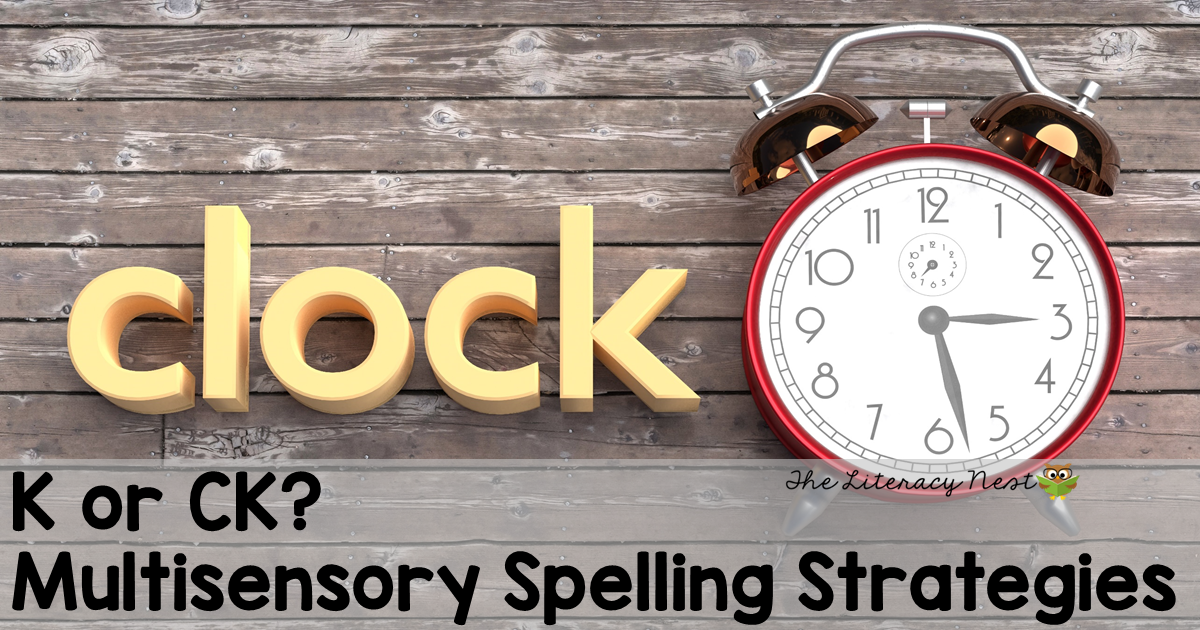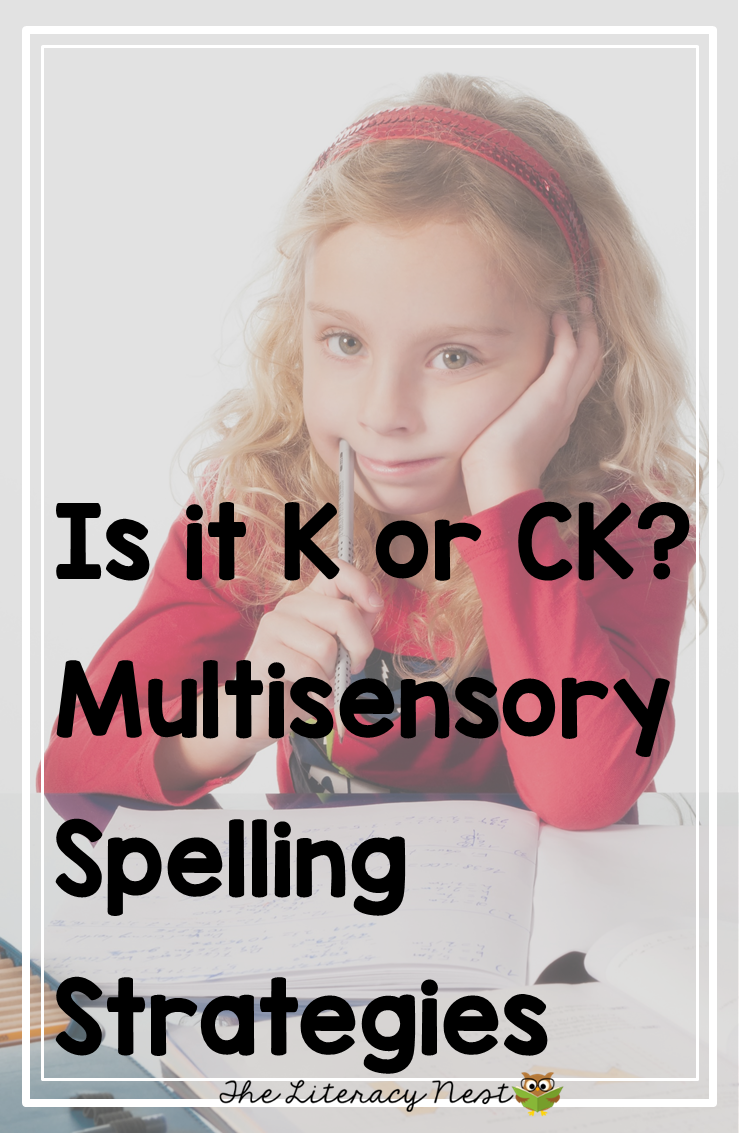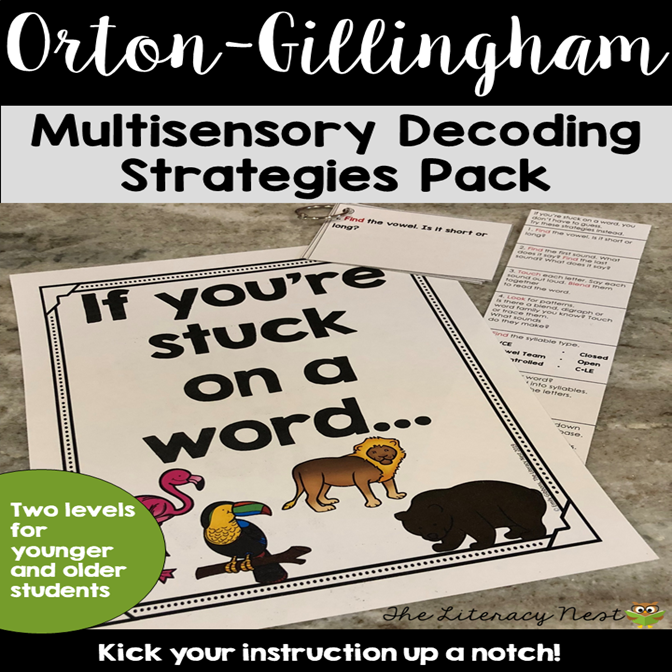English Spelling Ck and Meaning and Sentencefeeding

K or CK?
Is there a rhyme or reason?
After introducing the FLOSS rule, the next spelling generalization that is usually taught is the K/CK spelling generalization. This is an incredibly useful and freeing spelling generalization that allows students to spell many words using standard spelling. This generalization applies to the END of words and is really only reliable with single syllable words. This generalization states that when you hear the /k/ sound at the end of a word AND the /k/ immediately follows a short vowel sound, it is spelled ck. If it is preceded by a long vowel or consonant, it is spelled with a k.
In order to teach this generalization, it is helpful for students to know closed and vowel-consonant-e syllable types, be familiar with the terms long and short vowel and discriminating between the two by sound, know the consonant digraph ck and be able to segment a word of 4 or 5 sounds. It is important to refrain from giving words ending in k and ck in dictation until this generalization has been taught.
Some words that follow this generalization include:
snack truck sock quick neck
Task sulk honk milk perk
Make Luke poke bike sneak
Park pluck spook stick creek
There are a few categories of words where this generalization doesn't quite work. There are a number of words where ck is used in the middle of a word like chicken or ticket. These words are best addressed later on when teaching the schwa sound. In multisyllable words ending with the /k/ sound, it is often spelled with c. Examples include: frantic, fantastic, maniac and zodiac. Also, the k/ck generalization does apply to the individual parts of a compound word such as backpack. There are a handful of other exceptions (many of which are shortened forms of longer words) such as zinc, mac, talc, narc and sync.
As students are becoming familiar with this spelling generalization, it can be helpful to have a set of guiding questions.
- Is this word one syllable?
- Is the vowel short or long?
If the vowel sound is short, does the /k/ sound come after a consonant such as l, n or r? If no, add CK. If yes, add K.
If the vowel sound is long, such as magic e or a vowel team, add K.
I have found that this particular spelling generalization takes a long time to master. It is important to provide a great deal of practice and opportunities to put this learning to use.
Some teaching ideas include:
- Sorting – You can sort words by spelling or sort pictures by medial sounds to build skills listening for short vowels.
- Review activities – Spending just a couple of minutes each lesson working with this generalization will help to solidify the learning. Have the student fill in the blank with k or ck to finish spelling words. Ask them to segment a word into its sounds using counters or blocks and decide whether to use k or ck at the end.
- Dictation — Make sure to choose words that uphold the generalization. Have your student practice finding the base word and applying the spelling generalization before adding the suffix.
- Games — Play games where the student not only needs to read, but actually make spelling choices between k or ck. Make a word list that includes words with k and ck. Have the student spell a word. If they are able to spell the word correctly, they can roll a die and move along a game board. This basic principle can be adapted in a number of ways. Use a short game board for a quick review. Skip the game board entirely and play until you roll to 20 or 30. Challenge the student to get to 100 and color in a hundreds chart over the course of several lessons.
- Spiral and Review – It can be helpful to review this spelling generalization before teaching other short vowel spelling generalizations. I find that each spelling rule lays the foundation for those that follow.
Incorporating k/ck practice into SOS review words is an excellent way to keep this learning fresh. If there are few concepts needing intensive review, cycling through spelling generalizations is always an appropriate review.
As new learning is added to your student's repertoire, especially adding suffixes or using -ic at the end of multisyllable words, it is often helpful to review the k/ck generalization to help situate it within the larger context of English spelling.
- Verbalize – It is very valuable to have students explain the spelling generalization in their own words. Usually it is easiest for them to explain when to use CK, rather than explaining all the many circumstances when they would use K. Another way to encourage students to have a deep understanding and ability to explain the generalization is to ask them why they made the spelling choice that they did. For example, in the word shack, you could ask the student why they used ck or why they chose to use k in the word mask or leak. This will often expose any misunderstandings or areas that need clarification.
For a typically developing reader, who maps words in relatively few repetitions, these generalizations often form with only a few examples and typical practice. Many general education teachers may not even be aware that there is a spelling generalization at all. I was volunteering in my 1st grader's classroom and a child misspelled the word mask as masck. The teacher told the student that they just needed to learn that word ended in k. It was difficult for me not to jump in and teach the reading group the k/ck generalization on the spot. While some students may be able to learn mask and extrapolate that learning to words like task and frisk and tusk and maybe even milk or bulk, that is not the case for many students. For students with dyslexia, mapping words to memory so they become automatic is a much slower process. Having a spelling generalization is a valuable tool for them to effectively and efficiently spell hundreds of words.


Be sure to catch the other spelling generalization blog posts HERE for LOTS more tips. I've got you covered. 😉
- If you are seeking further practice, this CK Digraph activities pack is great for Orton-Gillingham activities or other reading interventions.
- For stopping by my blog today, here is a FREE K or CK controlled reading passage! It comes from my Spelling Generalization Decodable Stories pack.
- I've created resources to support teaching spelling generalizations over the years, but nothing as comprehensive as this Spelling Generalizations Bundle .
- With eleven resources and ALL NEW material, this bundle has EVERYTHING you need to teach spelling generalizations effectively.


Did you hear the news?
Are you seeking resources for dyslexia intervention and Orton-Gillingham lessons? Find them on sale!




Enjoy the sale!
Do you receive my weekly Tuesletters? It's not really as big as a newsletter, but it comes every Tuesday, so I call it a Tuesletter! Sign up HERE, and grab a freebie while you're at it to be added.
Source: https://www.theliteracynest.com/2019/01/the-k-or-ck-rule-in-spelling.html
Post a Comment for "English Spelling Ck and Meaning and Sentencefeeding"